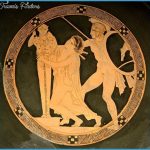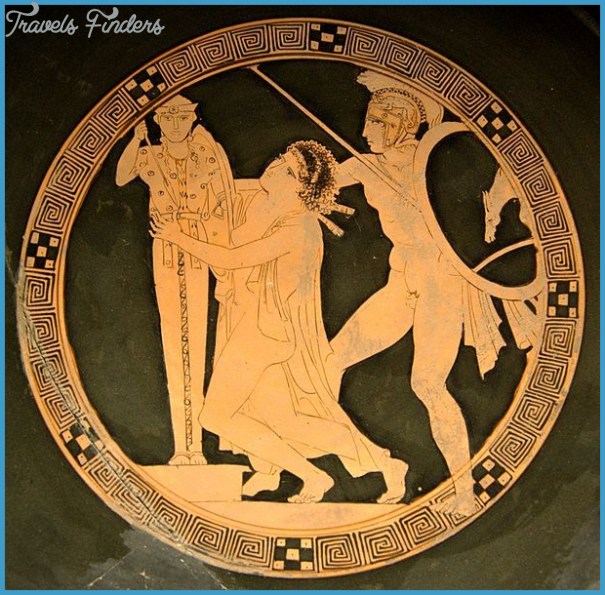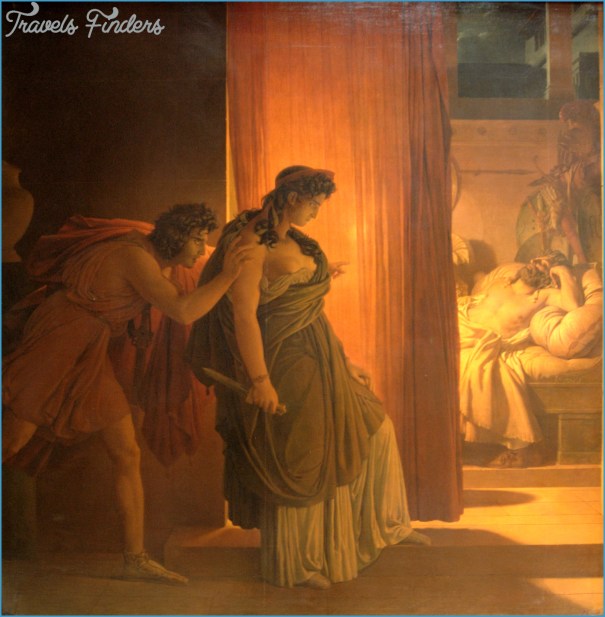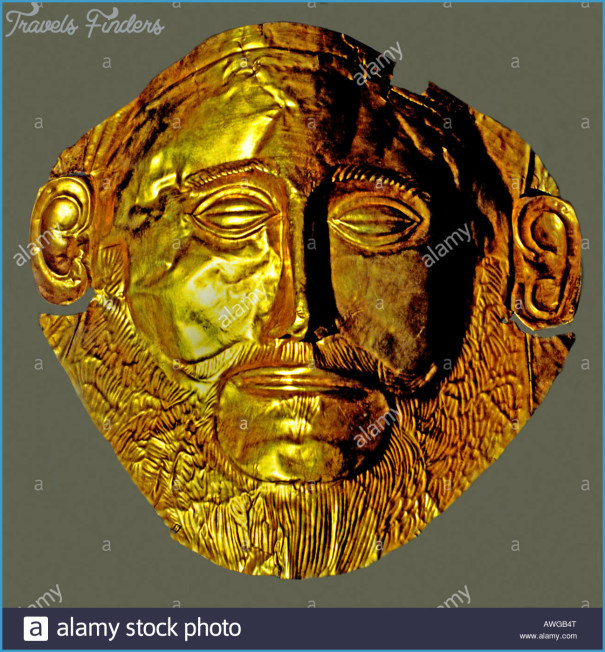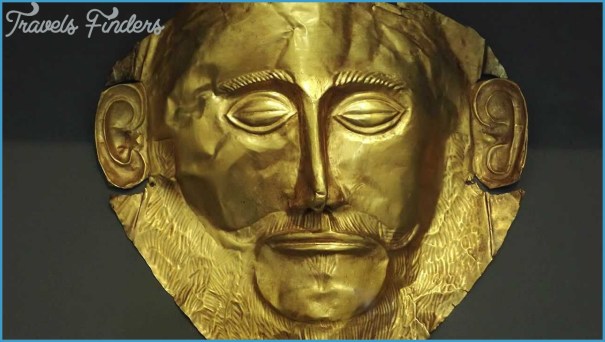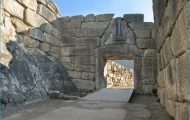To warn her of Agamemnon’s homecoming when war was over, Clytemnestra arranged a chain of beacons from Mount Ida near Troy, across to Samothrace and Mount Athos, and down the east coast to Mycenae, where a sentry kept watch on the palace roof. At last the message came. Soon Agamemnon was driving triumphantly into the palace courtyard, where Clytemnestra met him. Feigning happiness, she begged Agamemnon to celebrate his victory by walking into the palace not on bare earth but over costly woven tapestries. Agamemnon hesitated, fearing this would provoke divine retribution. Then he agreed.
Inside, Clytemnestra prepared Agamemnon a hot soothing bath. But no sooner was he in it than she threw a net across him, stabbing the struggling king repeatedly with a sword – or hacking at him with an axe. Bellowing like a sacrificial bull, Agamemnon fell dying in the blood-fouled bath. He had brought home with him a Trojan concubine: Cassandra, the prophetess daughter of King Priam She sensed Mycenae’s horrors past, present and future, and realizing that her death, too, was near, she was killed beside Agamemnon’s corpse, her body flung into the gorge of Chaos. Agamemnon’s daughter Electra hurriedly gave her young brother Orestes to a trusted slave and bundled them out of Mycenae’s northern gate with instructions to escape to Phocis, where Strophius was king. Here Orestes grew to manhood.
The Assassination of Agamemnon Photo Gallery
The Return of Orestes
Later, in disguise, Orestes returned to Mycenae with his cousin Pylades. At Agamemnon’s tomb, he was disturbed by a procession of women, come to make offerings to his father’s ghost. Orestes recognized their leader: Electra. Clytemnestra had sent her, having dreamt that she gave birth to a serpent that sank its fangs deep in her breast. Discovering that Electra also hated their mother, Orestes revealed his identity to his sister and the two plotted their revenge.
Aeschylus tells how, driven to matricide by the god Apollo, Orestes tricked Clytemnestra into summoning Aegisthus, whom he butchered before turning his sword on his mother. Recognizing Orestes at last, she bared her breast, demanding how he could kill the woman who once suckled him. It was to no avail. Sophocles has another version. His Orestes brings false news of his own death in a chariot race and gains access to the palace by giving Clytemnestra an urn containing her son’s ashes. He then kills his mother before leading Aegisthus ominously into the palace.
The most radical retelling of the myth comes from Euripides. Here, Electra is married to a peasant, and a reluctant Orestes reveals his identity only after being recognized by an old retainer, who cajoles him into vengeance. Impiously he slaughters Aegisthus at a sacrifice. A messenger describes the scene to Electra:
Aegisthus took the entrails and gazed at them, easing them apart with his fingers. And as he bent down low to look, your brother, rising tall up on his toes, crashed the cleaver heavy on his spine, smashing his back bones from their sockets. Aegisthus body writhed in spasms, juddering, twitching, and death came hard.
Together Electra and Orestes stab Clytemnestra, whom they have first lured to the house by pretending that Electra has given birth to a baby girl. Electra and Orestes fascinated Euripides. In his tragedy Orestes, set just days after the matricide, he portrays the young man as a psychopath, who kidnaps Menelaus daughter Hermione before then trying to murder Helen.
Orestes Acquittal
With no family member left alive to take vengeance on Orestes, the gods sent the Erinyes to pursue him Crazed with terror, Orestes fled to Delphi, then to Athens, where Athene established the first law court. The Furies insisted that matricide must be punished, Apollo that it was Orestes duty to avenge his father. Athene used her casting vote to acquit Orestes, insisting that fathers take precedence over mothers, as her own birth from Zeus head showed.
Some tell how Orestes then travelled with Pylades to Tauris, where his sister Iphigenia rescued him from being sacrificed, and together they escaped to Greece. There Orestes fell in love with his cousin Hermione. That she was married to Achilles son Neoptolemus was an inconvenient detail. Orestes arranged for the murder of his rival in the Temple of Apollo at Delphi before regaining Mycenae and conquering much of the Peloponnese, which he ruled from Sparta. He was buried in nearby Tegea, where sixth-century bc Spartans found his bones. Meanwhile Mycenae passed from mythology.

